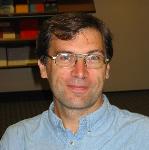


Patrice Koehl
Department of Computer Science
Genome Center
Room 4319, Genome Center, GBSF
451 East Health Sciences Drive
University of California
Davis, CA 95616
Phone: (530) 754 5121
koehl@cs.ucdavis.edu

 |

| Patrice Koehl |
Data Sciences: Bridging Mathematics, Physics and Biology |
29 May - 16 June 2017 and 30 November - 8 December 2017 |
Organizing committeeCo-chairs
Members
OverviewAdvances in technology and the ever-growing role of digital sensors and computers in science have led to an exponential growth in the amount and complexity of data that scientists collect. We are at the threshold of an era in which hypothesis-driven science is being complemented with data-driven discovery. This alternative way to pursue research is especially visible in modern biology, with the advent of genomics and the development of multiple imaging techniques to visualize living organisms at multiple time and length scales. The data collected are complex in size, dimension, and heterogeneity - all three generating the generic term "Big Data". These data provide unprecedented opportunities for new discoveries; they also come with challenges that need to be addressed. Those challenges come at different levels of understanding of the information content of the data. They require expertise from multiple disciplines to be addressed successfully. There is a need to develop new mathematical models for formalizing the information content of data. There is a need to develop novel efficient algorithms for dimensionality/complexity reduction, as well as tools for statistical analysis, and approaches to data exploration and visualization. The central theme of this program relates to the former. We survey and discuss mathematical topics and methods that are emerging from the applications in data sciences. There are three sub-themes under the program:
There will be one tutorial session and one workshop on each of these sub-themes. Here we focus on the second theme. The corresponding program will focus on the following mathematical foundations and their applications: geometry and topology for representing, searching, simulating, analyzing, and visualizing biological data as well as the biological systems they represent. Overall, this program will establish tangible links between theories and applications in data sciences, and provide a practical platform for interdisciplinary collaborations. Activities
|
| Page last modified 16 May 2017 | http://www.cs.ucdavis.edu/~koehl/ |